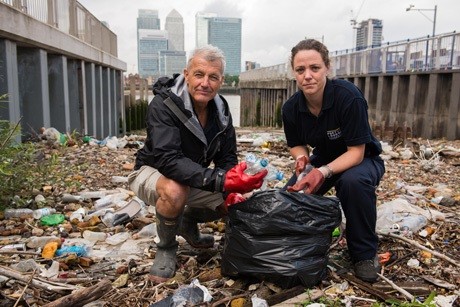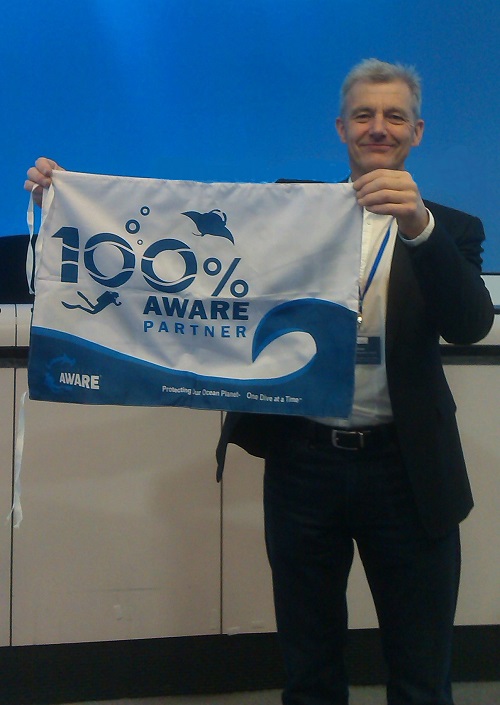UK Explorer Challenges London to Stop Littering the Thames

International explorer and 100% AWARE partner Paul Rose joined a Thames foreshore clean up on 30 September and called on Londoners to 'do the right thing' and make sure their rubbish goes in the bin, not in the river.
Paul kicked off the Port of London Authority (PLA)-led campaign at a clear-up on the Isle of Dogs' foreshore, overlooking historic Greenwich Royal Naval College. The campaign aims to raise awareness of the harm that rubbish in the Thames is doing to wildlife and why it's important to stop it getting there in the first place.
"I love the Thames," said Paul. "I grew up near by it in Rainham, so it was part of my everyday life for many years. Now I've come back to help raise awareness of the harm rubbish does in the river and the simple things you need to do to stop it getting there in the first place.
"The message to people is simple: do the right thing. Bag up your rubbish and make sure it's disposed of properly. If you don't, the wind will snatch it and blow it along until it finds the water, stops dead and stays there. It only comes back out again when people like the PLA, Thames21 and their volunteers come along to take it, bag it and recycle it. If it's not recovered it ends up in the stomachs of seals, fish and other marine life in the river."
Thames Festival director, Adrian Evans, who oversees Totally Thames, joined the call for action. He said: "We've spent the whole of September celebrating the Thames, with events bringing over two million people to the river and its banks. So the message is simple. We've got eleven months until the next festival - in that time, let's do all we can stop the flood of rubbish going into the Thames."
Every year the PLA recovers more than 400 tonnes of rubbish from the river Thames. Some of it heavy wood which is hazardous to ships; the vast majority is plastic of all kinds, mostly bottles, but also spoons, cartons and Q Tips.
 "The river is like a great big rubbish magnet," said PLA chief executive, Robin Mortimer. "If you're close to the river and don't bin your coffee cup, water bottle or sandwich wrapper properly, there's only one place it's going to end up. And if we are not able to recover those plastics, they'll ultimately end up in the scores of birds, fish and seals that the river is home to." Rubbish in the world's rivers is feeding a global problem with large volumes of plastic floating in some parts of the ocean. Scientists say there are five large swirls known as 'garbage patches', where each square kilometre of surface water holds almost 600,000 pieces of plastic debris. Seabirds found with plastics in their gut include albatrosses, gulls, petrels, and penguins.
"The river is like a great big rubbish magnet," said PLA chief executive, Robin Mortimer. "If you're close to the river and don't bin your coffee cup, water bottle or sandwich wrapper properly, there's only one place it's going to end up. And if we are not able to recover those plastics, they'll ultimately end up in the scores of birds, fish and seals that the river is home to." Rubbish in the world's rivers is feeding a global problem with large volumes of plastic floating in some parts of the ocean. Scientists say there are five large swirls known as 'garbage patches', where each square kilometre of surface water holds almost 600,000 pieces of plastic debris. Seabirds found with plastics in their gut include albatrosses, gulls, petrels, and penguins.
Debbie Leach, CEO of Thames21 says the campaign is essential to halt a seemingly unstoppable tide of rubbish: "We go to the Thames foreshore, do a great clear-up, leaving the it clear of rubbish, go back a week later, the rubbish is back with countless bottles and bags to be recovered all over again. The only way to make progress is to stop the rubbish at source: when it leaves people's hands it needs to go in the right place, the bin."
The campaign is backed by groups including Thames21, Totally Thames, the Environment Agency, Thames Tideway Tunnel, Thames Estuary Partnership, London Wildlife Trust and the RSPB. It features four posters and a film in which Paul Rose explains the scale of the problem and how people can 'Do the Right Thing'.
The campaign launch comes as Thames Water gears up to start work on the Thames Tideway Tunnel which will stop the discharge of over 40 million cubic metres of raw sewage into the river every year.
"Forty years ago the Thames was biologically dead," said Tideway chief executive Andy Mitchell. "Today we've got 125 species of fish in the river, so progress has been fantastic. We're doing our bit to clean the river by building the Tunnel, now we're calling on Londoners to do their bit too. So we all have a river to be truly proud of."
For more information about how our everyday litter travels from land to sea, check out the Ugly Journey of Our Trashvideo and Infographic.



